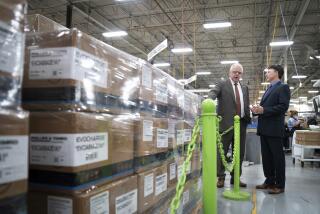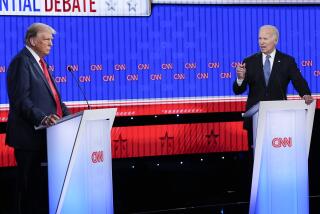Tim Pawlenty: Climate change most likely due to nature
- Share via
Tim Pawlenty said in an interview this week that the science of global warming remains unclear and that Earth’s shifting climate is more likely due to natural causes.
The interview with the Miami Herald marked the most recent example of Pawlenty’s evolution on the issue. Once an advocate of cap-and-trade policies to reduce carbon admissions, the former Minnesota governor has since recanted his support for such proposals.
As the GOP presidential candidate told the Herald’s Marc Caputo:, “Like most of the major candidates on the Republican side to varying degrees, everybody studied it, looked at it. We did the same. But I concluded, in the end some years ago, that it was a bad idea. . . . We never actually implemented it. I concluded ultimately it was a bad idea. It would be harmful to the economy. The science was I think based on unreliable conclusions.”
Pawlenty was then asked whether man-made climate change is a real phenomenon, as many climate scientists maintain.
“Well, there’s definitely climate change. The more interesting question is how much is a result of natural causes and how much, if any, is attributable to human behavior. And that’s what the scientific dispute is about,” he said. “There’s lots of layers to it. But at least as to any potential man-made contribution to it, it’s fair to say the science is in dispute. There’s a lot of people who say the majority of the scientists think this way. And there’s a minority that way. And you count the number of scientists versus the quality of scientists and the like. But I think it’s fair to say that, as to whether and how much -- if any -- is attributable to human behavior, there’s dispute and controversy over it.”
As Pawlenty’s hometown newspaper, the Minneapolis Star-Tribune pointed out, his stance seems to be a clear departure from the one he took during his second term as governor, when he made energy reform a linchpin of his policy portfolio.
Then, Pawlenty favored state legislation that sought to cap greenhouse gas emissions 15% by 2015 and 80% by 2050 and worked hard to promote renewable resources. He has since labeled his support for cap-and-trade plans a “clunker” on his record and has said it was a “mistake.”
Pawlenty’s position differs from that of rival Mitt Romney, who has also denounced cap-and-trade proposals, but has said that he believes climate change is caused by industrialization and does demand action.
But Romney isn’t courting the sort of die-hard social conservatives in Iowa that Pawlenty is, many of whom view global warming theories with suspicion. It also places him closer to the views of Rep. Michele Bachmann, Pawlenty’s top competitior in Iowa, who fiercly opposed the Democratic cap-and-trade bill in the House in 2009 and who has called carbon dioxide in the atmosphere “harmless” and global warming a “hoax.”
Next week is shaping up to be perhaps Pawlenty’s most significant test since the launch of his presidential campaign. The traditional straw poll will be held Aug. 13 in Ames, Iowa, and both Pawlenty and observers on the ground in Iowa have suggested he must finish among the top tier to demonstrate his viability as a national candidate.
Pawlenty’s campaign this week lost a key advisor, Al Hubbard, former director of the National Economic Council under President George W. Bush.
More to Read
Get the L.A. Times Politics newsletter
Deeply reported insights into legislation, politics and policy from Sacramento, Washington and beyond. In your inbox twice per week.
You may occasionally receive promotional content from the Los Angeles Times.










